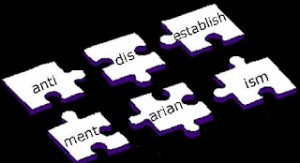Speaking of ‘Antidisestablishmentarianism’ (i nGaeilge, ar ndóigh) Posted by róislín on Aug 9, 2013 in Irish Language
(le Róislín)
Since the word “frith-dhíbhunaíochas” was introduced in the last blog, I thought it might be both informative and fun to break this word apart into its component elements. Also, some of you may have noticed that I inadvertently omitted the “anti-” prefix for the English word at one point during that discussion. “Ubh ar m’aghaidh,” mar a deirtear i mBéarla!
So, first I’d like to note that in the last blog (8/8/13), the sentence starting ” The Irish for ‘disestablishmentarianism’ is …” should have been ” The Irish for ‘antidisestablishmentarianism’ is ….” The ceartúchán has already been made sa leagan ar líne but for those who get their blog san r-phost, you received your copy before the correction.
That said, let’s look at “frith-dhíbhunaíochas” itself. First, pronunciation, which will also become clearer as we break the word apart:
frith– [frih, with a breathy “h” sound at the end]
-dhí– [yee]
bhunaíochas [WUN-ee-uh-khuss]
Altogether, [FRIH-YEE-WUN-ee-uh-khuss]. The emphasis on the first three syllables is almost equal, because we have two prefixes before getting to the core of the word. And, yes, that’s a bit unusual, but so is having two prefixes : )
Now for meaning:
frith-, anti-, counter-, etc., as in “frithchioclón” (anticyclone), “frithdhamhna” (antimatter), “frithéileamh” (counter-claim), and “frithcheilg” (counterplot).
Sometimes “frith-” is not translated as “anti-” or “counter-” or by any synonyms for that prefix, as in “frithsheasmhacht” (steadfastness, resistance) or “frithpháirteachas” (mutuality, in commerce or finance).
And just to bring us out of the realm of the abstract, back down to earth, or in this case, uisce, we have “frithghob éisc,” which means a “hooked jaw of a fish.”
dí [djee], the prefix, is lenited to become “dhí” [yee]. Why? Because this prefix is prefixed by the preceding prefix (i.e. the “frith-“). In Irish, prefixes generally cause lenition of the letters b, c, d, f, g, m, p, s, and t, as in “an-mhaith” and “róthe.” There are some exceptions, either where the affected consonant isn’t lenitable anyway (drochlá, a bad day) or where certain sounds are adjacent (an-deas, very nice).
The prefix “dí” can be translated as English “de-,” “di,” “dis-,” “in,” or “un.” For current purposes , “dis-” is obviously the most suitable translation. How about some other words with this prefix? A “dí-adharcóir,” an implement which I have never used, would be important in animal husbandry. It’s translated as a “de-horner.” “What’s that?” you’re thinking. No, not quite that important! That implement would, I believe, be a “deimheas coillteoireachta” (or “spochadóireachta“) although I must confess that once again, I’ve never used one and am not sure I’ve ever seen one. A few more examples of “dí-” are: dí-adhlacadh (exhumation), dífháscadh (to decompress), and dí-ocsaídiú (deoxidation).
And now the most interesting part:
bunaíochas
As a noun, this wouldn’t normally be used on its own, at least in my experience, but we do have the adjective “bunaíoch” (primitive, in the biological sense, i.e. relating to the fundamental). The verb “bunú” means “to found” or “to establish,” or essentially, “to create the foundation for.”
And that brings us down to “bun an scéil,” i.e. “the bottom of the story”:
bun, base, bottom, stump, lower end, foundation, etc.
For pronunciation, note that while the Irish word “bun” (base, etc.) looks just like English “bun” (the pastry), they are pronounced differently. Irish “bun” has the “u” sound of English “put” while English “bun” has the “u” sound of English “putt,” as in golf.
As for the suffix “-aíochas,” it’s used fairly frequently for the “-ism” suffix in English. Examples range from newish terms such as “Afra-thodhchaíochas” (Afro-futurism) to more basic ones such as “gnéasaíochas” (sexism) and “gníomhaíochas” (activism). And then there are the self-explanatory ones like “Trotscaíochas.”
A variant of the suffix,”-íochas,” is used for words whose roots end in slender vowels (e or i), such as “ciníochas” (racism) and “boilscíochas” (inflationism).
Anyway, sin bun agus barr scéal an lae inniu, in other words, that’s it for this blog, and I hope the missing “anti-” didn’t cause too much confusion for you “r-phost” readers. SGF, Róislín

Build vocabulary, practice pronunciation, and more with Transparent Language Online. Available anytime, anywhere, on any device.





Leave a comment: